DPI/AP Reports 2008
The Regional Seminar on Capacity-building of DPOs in Promotion of the CRPD
Executive Summary
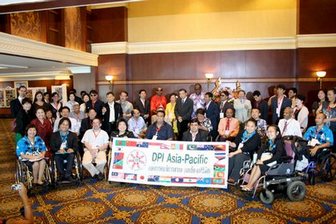
The Regional Seminar on Capacity-building of National Disabled People's Organization in Promotion of the Convention on the Rights of Persons with Disabilities (CRPD) was organized by the Disabled Peoples' International Asia-Pacific (DPI/AP) from 2 - 4 July 2008 at the Prince Palace Hotel, Bangkok, Thailand. This regional seminar was supported by the ABILIS Foundation and Disabled Peoples' International-Thailand.
The objectives of the seminar were to raise awareness of all stakeholders regarding the Convention on the Rights of Persons with Disabilities (CRPD) and its important human rights convention towards ratification and implementation in alignment with BMF and to strengthen the advocacy capacities of self-help organizations of persons with disabilities in order to raise awareness of all stakeholders for the development of anti-discrimination legislation in their respective countries.
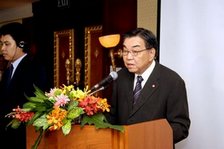
In total, there were 57 participants (excluding DPI/AP staff and volunteers) from Bangladesh, Cambodia, Cook Islands, Fiji, India, Indonesia, Japan, Lao PDR, Malaysia, Maldives, Nepal, Pakistan, Papua New Guinea, Philippines, South Korea, Sri Lanka, Thailand and Vanuatu. Among those countries, there were 24 participants (four of them also acted as speakers for the seminar) from DPI/AP Member National Assemblies (MNAs). Interestingly, there were 24 observers from Afghanistan, Bangladesh, Japan, South Korea, Thailand and Vietnam. Lastly, there were 9 speakers and one of them is Mr. Steven Estey from DPI Headquarters, Canada as a main speaker and facilitator for the seminar. This time, among the 26 DPI/AP's MNA, there were 18 MNAs and 2 non-MNAs (Afghanistan and Vietnam) participating.
The first day of the seminar was inaugurated by H.E. Mr. Chavarat Charnvirakul, Minister, Ministry of Social Development and Human Security and our keynote speakers namely, Mr. Shoji Nakanishi (Regional Chair, DPI-AP), Mr. Steven Estey (DPI-Headquarters) and Mr. Prayat Phunong-ong (Treasurer, DPI-AP). The first day's seminar focused on the overview and history of the Convention on the Rights of Persons with Disabilities (CRPD), international monitoring mechanism of the Convention and the alignment effect of CRPD and the Biwako Millennium Framework (BMF).
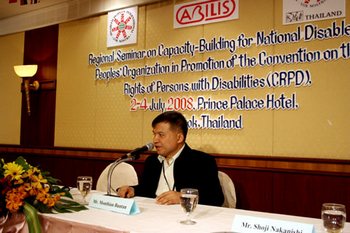
From the first day, the participants could learn the history and importance of the Convention. They learned that CRPD promotes and guarantees the human rights of persons with disabilities by stating that persons with disabilities are the right holders not recipients. Unlike other international conventions, CRPD also covers anti-discrimination, reasonable accommodation and social participation concept. Besides, the session on CRPD Article in Depth by Mr. Steven Estey, DPI-HQ, could help the participants understand the interdependency of rights e.g. if the right to education of persons with disabilities is denied, the right to employment can also be denied because they are illiterate to work. The final session of the first day on the alignment of CRPD and BMF explained the similarities of CRPD and BMF as well as BMF+5. Some examples of the similarities are paradigm shift from charity-based to rights-based approach, equality and anti-discrimination.
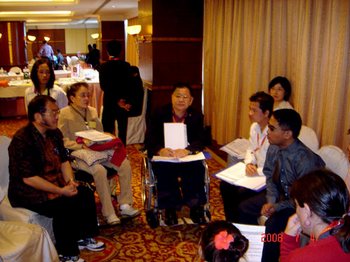
The second day focused more on preparation for signing and ratifying the Convention. To do this, participants presented their country situation on human rights and disability-related legislation in their respective countries. After that they broke into groups and discussed how to advocate for and promote the Convention, especially on the issues of women with disabilities, independent living, accessibility, political and public life, education and employment. They also practiced role playing on how disabled peoples' organizations approach government and media for collaboration and support.
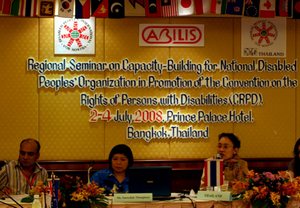
From the second day, participants learned from other countries on the situation of disability human rights and legislation issues. Many countries are still in processes of formulating legislation on disability; some countries have anti-discrimination legislation (Japan and South Korea); some countries have already ratified the Convention (Bangladesh and India). Many countries do not ratify the Convention because domestic laws/legislation are not disability-friendly, which means they are not rights-based or even discriminate against persons with disabilities, so amendments on these laws are needed. Participants learned that it is important to have advocacy activities and network with government and civil society in order to ratify or sign the Convention. Besides, media is an important factor that can help promote and advocate for the rights of persons with disabilities. The session on Role Playing could simulate how DPOs can work with governments and media and thus gave them skills to do advocacy and lobbying with those partners.
The last day focused more on international/inter-regional cooperation amongst stakeholders in the region, partnership with UN agencies, Millennium Development Goals (MDGs), women with disabilities and the role of DPI to promote CRPD. In the final session, participants shared what they had learned and their future plan towards signing, ratifying, implementing and monitoring CRPD.
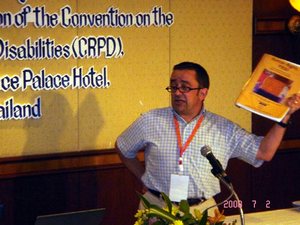
From the last day, participants learned how to network with international/inter-regional or even national organizations, which is needed to work on disability issues. In the session on women with disabilities, Ms. Saowalak Thongkuay, Regional Development Officer, DPI-AP, shared that DPOs should be more proactive in trying to mainstream person with disabilities into other movements--DPOs should not only wait for other people to include them. The session on Role of DPI to promote CRPD introduced the DPI ratification and implement toolkits, which can guide participants from the beginning to start processes to ratify the Convention until the implementation and monitoring processes.
Importantly, young leaders with disabilities were encouraged to practice their leadership skills by taking turns to facilitate several sessions in the seminar.
In conclusion, the regional seminar successfully raised awareness on CRPD among the stakeholders. Some participants, especially DPI-AP members, said that they did not know much about CRPD and thus did not see any importance of how this Convention can be an effective tool to advocate for their rights, but they could see it now after the seminar. Now they understand that CRPD will not only protect their rights, but also prevent discrimination and assure social participation. Therefore, with the skills they learned from the seminar, they will undertake advocacy and lobbying activities with their governments so that they will sign or ratify the Convention within one year.
Please read the full report in PDF file from : http://www.dpiap.org/reports/pdf/CRPD_executive_summary.pdf
Author: Mr. Sawang Srisom, ARDO
Language: English
When: 1/8/2008
